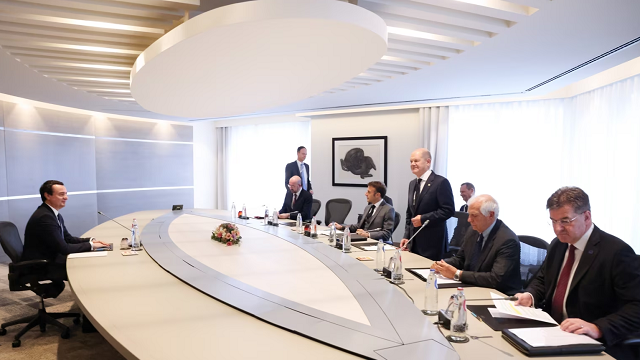Since before 2013 the US and EU have sponsored a “political” dialogue between Kosova and Serbia intended to “normalize” their relations. This effort recently has been based on a German-French initiative aimed at a “two Germanies”-type agreement. East and West Germany in 1972 agreed to “…develop normal good neighborly relations with each other on the basis of equal rights.” The result for the Balkans was a Brussels agreement promulgated in February and an Ohrid implementation plan promulgated in March. Kosova has accepted both and offered to sign on the dotted line. Serbia has rejected both and refused to sign.
Belgrade also sponsored an attempted insurrection in northern Kosova on September 24. It was intended to precipitate a Kosova police reaction that would justify a Serbian military intervention. Serbia has celebrated the insurrectionists, whom it armed and trained. Belgrade has not taken responsibility or apologized for the terrorist acts its agents perpetrated.
This brings to an end any serious prospect for progress in the dialogue as presently constituted. So what is next? First, a careful look at what went wrong is in order.
Misjudgments
The European and American diplomats misjudged Belgrade, which has always insisted it would not recognize Kosova. This explicitly includes any “back door” recognition, which is what the recent “normalization” non-agreements intended. Serbia has continued instead to look for, or create, opportunities to control the four northern Kosova municipalities with Serbian majorities. President Vucic attempted to negotiate their annexation to Serbia with former Kosova President Thaci. He has now tried to create a pretext for annexing them by military force.
The Americans and Europeans also misjudged Prishtina. They attempted to force Prime Minister Kurti to create an Association of Serb Majority Municipalities. That would provide Vucic with the control over northern Kosova he has sought. While the Americans promised not to allow the Association to become a governing entity, they have not been willing to show how they would prevent that from happening or to guarantee it in a formal governmental agreement.
Mistaken realignment towards Serbia
The Europeans have also failed to put their own house in order. Five European Union member states do not recognize Kosova. This split in the EU has weakened its mediator, Miroslav Lajcak. In addition, Hungary, though a recognizer, has aligned itself with Russia and Serbia against Kosova. The result is a lowest common denominator EU policy that is more respectful of Belgrade’s interests than Prishtina’s.
The Americans have also aligned themselves more with Belgrade than Prishtina in recent years. This appeasement was intended to move Serbia closer to the West and away from Russia and China. That effort has blatantly failed. Serbia has repeatedly preferred its military relations with Russia and its commercial relations with China over strengthened relations with the United States or Europe.
What would work better
First the Europeans and Americans need to correct their errors. This would mean rebalancing policy towards Prishtina and away from Belgrade. It also means dropping overly ambitious goals. The Association and even backdoor recognition are not feasible, the former because of concerns in Prishtina and the latter because of concerns in Belgrade.
The so-called “technical” dialogue that Belgrade and Prishtina pursued prior to 2013 was far more successful than the “political” dialogue that came thereafter. It produced numerous agreements intended to improve life in both Kosova and Serbia. Some have not been fully implemented. It is high time to return to those. Some may need revision.
To ensure implementation, the Americans and Europeans could form a monitoring group like the International Civilian Office that ensured implementation of the pledges Kosova made at the time of independence. Such a group should include, in addition to prominent European and American leaders, Kosova and Serbian government representatives as well as nongovernmental organizations. The aim should be 100 per cent implementation of the existing technical agreements and any additional ones reached.
One of the most important missing ingredients in relations between Serbia and Kosova is personal contact. While at the leadership level they know each other well, the societies do not. The Europeans would do well to sponsor a major citizen-to-citizen effort, like the one that improved relations between France and Germany after World War II.
Postpone the politics
Some will be concerned that postponing the “final comprehensive agreement” would be a mistake. Certainly Kosova needs recognition and United Nations membership as soon as possible. But it is not possible with the current political leadership in Belgrade and its alignment with Moscow and Beijing. Nor is the Association of Serb Majority Municipalities possible for the current political leadership in Prishtina, especially in the wake of the September 24 terrorist attack. Both these agenda items should be postponed to the end of the normalization process.
The political situation is not “ripe.” There is no “mutually enticing way out.” Nor is there European and American will to ripen the conflict or create a mutually enticing way out. Conflict management types will recognize these as the necessary conditions for a successful negotiation. But there are lots of things to do other than final status. Without political will, the technical dialogue should be prioritized.
